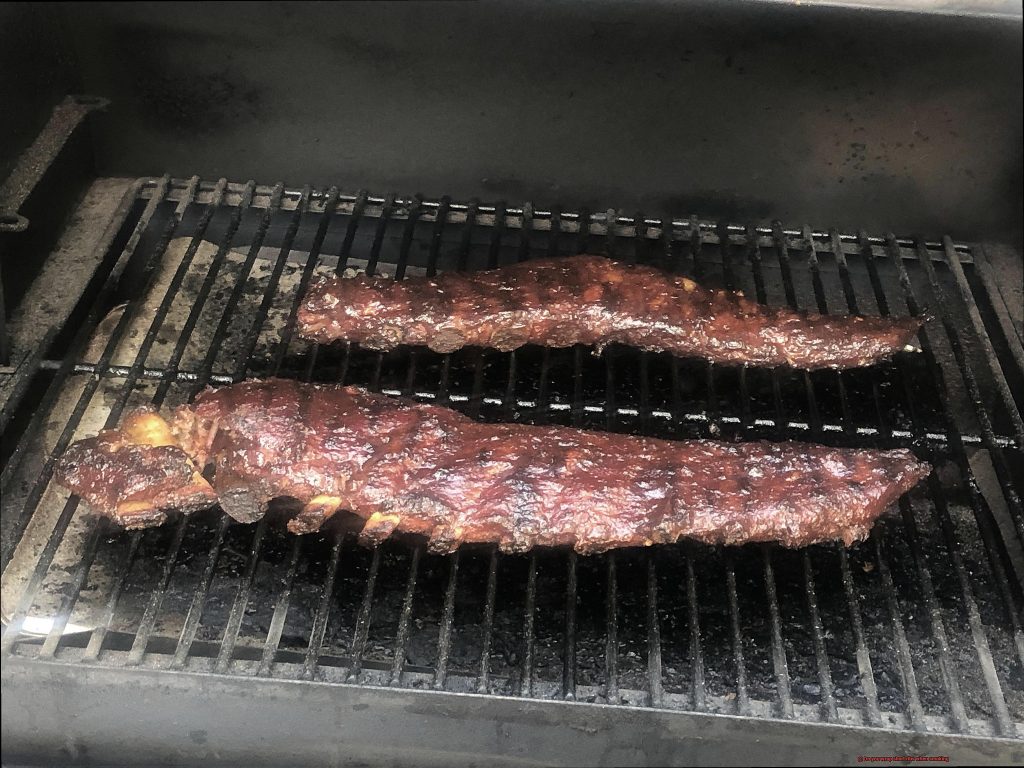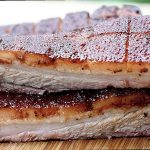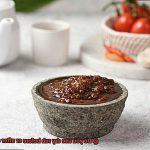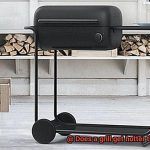Are you a meat-smoking enthusiast who’s unsure if wrapping short ribs is the way to go? This topic can cause quite the debate within the smoking community. Some swear by the Texas Crutch method, while others prefer to leave their meat unwrapped. So, what’s the right approach? Should you wrap your short ribs when smoking?
In this blog post, we’re going to dive deep into the world of smoking short ribs. We’ll take a look at the pros and cons of wrapping meat while smoking and help you decide which method is best for you. Plus, we’ll discuss various wrapping techniques and materials so that you can choose the perfect approach for your specific needs.
But before we get into all of that, let’s explore why people wrap their meat while smoking. Spoiler alert: it’s not just about speeding up the process. Wrapping can enhance both flavor and texture, resulting in mouthwatering fall-off-the-bone goodness. Whether you’re an experienced pitmaster or a curious beginner, keep reading to learn everything there is to know about smoking short ribs and wrapping them to perfection.
Contents
The Debate: Wrapping vs. Not Wrapping
Both methods have their pros and cons, but the decision ultimately comes down to personal preference and experimentation.
Those who advocate for wrapping argue that it helps retain moisture and creates a more tender, juicy final product. This is especially important if you’re using a smoker with less moisture retention, such as a pellet or electric smoker. Wrapping can help prevent dryness and ensure that your short ribs come out perfectly cooked. The “Texas Crutch” method, where meat is wrapped in foil during the smoking process, is often cited as a successful technique for this reason. However, opponents of wrapping argue that this method can result in a steamed texture rather than a true smoked flavor.
On the other hand, those who prefer not to wrap argue that it allows for better smoke penetration and a more authentic BBQ flavor. They also point out that not wrapping can result in a better bark on the outside of the meat. The bark, which is the crusty exterior of the meat, is highly prized among BBQ enthusiasts for its texture and flavor.
So, how do you decide whether to wrap or not to wrap? Here are some factors to consider:
- Type of Smoker: If you’re using a smoker with high moisture retention, such as an offset or charcoal smoker, wrapping may not be necessary. However, if you’re using a smoker with less moisture retention, then wrapping may be more beneficial in preventing dryness.
- Temperature: If you’re smoking at a lower temperature for a longer period of time, wrapping may help speed up cooking time without sacrificing tenderness. However, if you’re smoking at a higher temperature for a shorter period of time, such as with beef ribs, wrapping may not be necessary as the meat will cook through before drying out.
- Fat Marbling: Short ribs with more marbling may benefit from wrapping as the fat will melt and help baste the meat, while leaner cuts may not require wrapping as they have less natural moisture to retain.
Factors to Consider When Deciding Whether or Not to Wrap
When it comes to smoking short ribs, the decision to wrap or not to wrap can be a contentious one. However, before you take a side, there are a few factors you should consider.
Firstly, it’s important to understand why wrapping meat in foil or butcher paper is a popular technique. Wrapping helps to retain moisture and creates a steamy environment around the meat that speeds up the cooking process. But some experts argue that wrapping can impact the texture and flavor of the meat by softening the bark and preventing smoke from penetrating the surface.
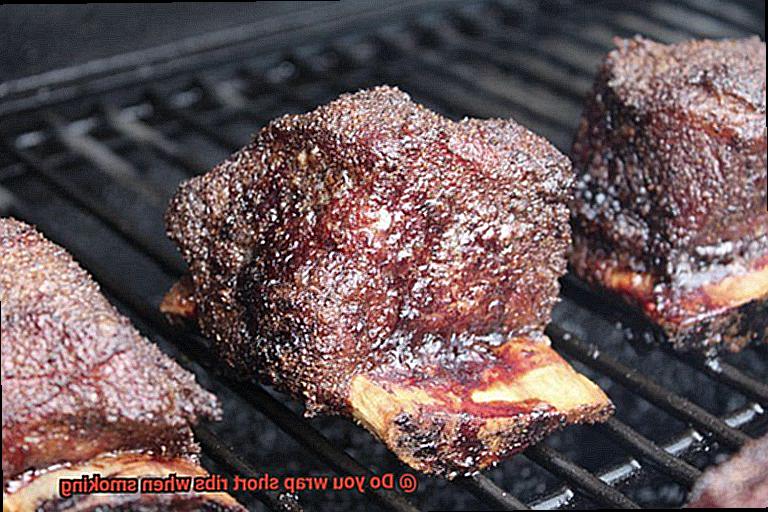
Another important factor to take into account is the type of smoker you’re using. Pellet or electric smokers have built-in mechanisms for retaining moisture, which means that wrapping may not be necessary. On the other hand, stick burners or charcoal smokers tend to dry out meat more quickly and could benefit from wrapping.
Ultimately, the decision to wrap or not to wrap comes down to personal preference and the desired outcome. If you’re after a tender, juicy result with a softer bark, wrapping might be your best bet. However, if you’re looking for a crispy bark and a more traditional texture, forgoing wrapping could be the better option.
It’s also worth noting that there are alternative methods for retaining moisture besides wrapping. Spraying or mopping your meat with a liquid during cooking can be just as effective. Take the time to experiment with different techniques until you find what works best for your preferences and equipment.
Benefits of Wrapping Short Ribs
While some argue in favor of the no-wrap method, others claim that wrapping short ribs in foil or butcher paper yields superior results. As an expert on this topic, I can confidently say that wrapping your short ribs offers several benefits that will elevate your smoking game.
First and foremost, wrapping short ribs helps to retain moisture and flavor. Short ribs are notoriously tough and require an extended cooking time to break down the collagen and become tender. During this process, the meat can easily dry out and lose flavor. However, when you wrap your short ribs in foil or butcher paper, it creates a seal that locks in the natural juices and flavors, resulting in a succulent and flavorful end product.
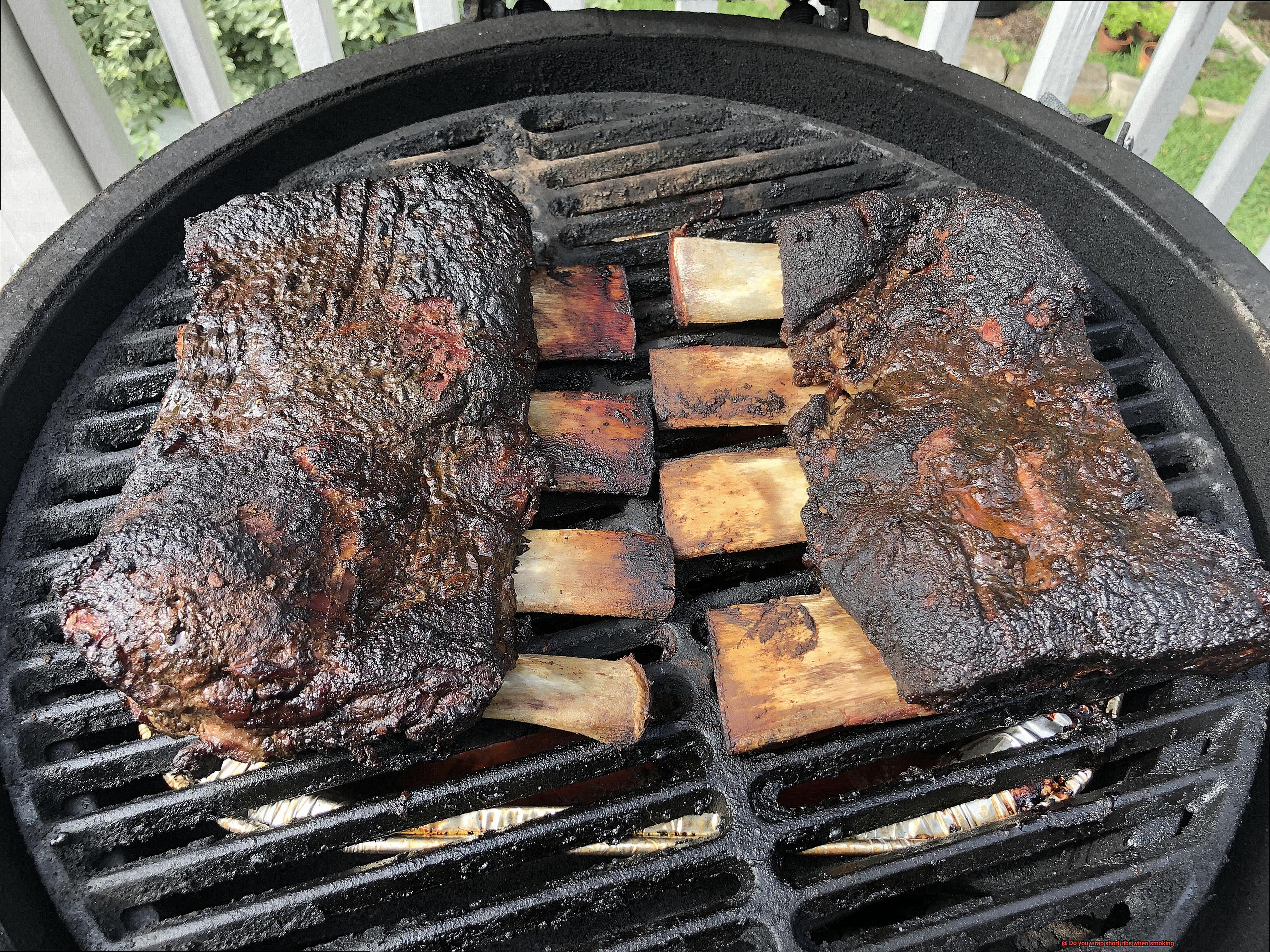
In addition to preserving moisture and flavor, wrapping short ribs can also speed up the cooking process. By creating a mini-oven around the meat, it allows for more even cooking and reduces cooking time by several hours. This is particularly useful when dealing with large or tough cuts of meat.
Wrapping your short ribs also gives you greater control over the cooking process. You can monitor your meat more closely and make adjustments as needed. For example, if you notice that your short ribs are drying out too quickly, adding liquid to the foil or butcher paper can help keep them moist.
Finally, wrapping your short ribs enhances their appearance. The seal created by the foil or butcher paper locks in moisture and flavor, producing a more attractive and appetizing final product. This is especially important when presenting your short ribs at a competition or serving guests.
Drawbacks of Wrapping Short Ribs
As someone who loves to smoke meat, I know that wrapping short ribs is a popular technique that can create a mouth-watering meal. However, before you wrap your next batch of short ribs, let’s dive into the potential drawbacks.
First and foremost, let’s talk about the bark. The crispy and flavorful outer layer of the meat is one of the most important aspects of smoking. Unfortunately, wrapping short ribs can result in a softer bark due to the moisture from the meat getting trapped inside the wrap. This can be a disappointment for those who savor a crunchy texture on their smoked meat.
In addition, wrapping short ribs can also lead to a loss of smoke flavor. Smoke is a crucial element in creating a rich and savory taste in smoked meats. When you wrap your short ribs, you’re actually protecting them from the smoke, which means that the meat may not absorb as much smoke flavor as it would if left unwrapped. If you’re all about that smoky goodness, then you might want to skip the wrap.
Lastly, wrapping short ribs can prolong the cooking time. The additional time needed for the meat to cook while wrapped can result in a longer overall cooking time. This can be frustrating for those who are tight on time or just really hungry.
So, while wrapping short ribs during smoking can produce tender and juicy meat, there are some drawbacks to consider. Here’s a quick rundown:
- Softer bark: Wrapping can lead to a loss of crunchiness on the outer layer of the meat.
- Loss of smoke flavor: Wrapping can prevent the meat from absorbing as much smoke flavor as it would if left unwrapped.
- Longer cooking time: Wrapping can prolong the overall cooking time.
Different Types of Smokers and Their Impact on Wrapping
Smoking short ribs is a culinary art that involves patience, attention to detail, and the right equipment. The type of smoker you use can have a significant impact on whether or not to wrap your meat during the cooking process. Let’s dive deeper into the different types of smokers and how they affect wrapping.
Offset smokers are a classic choice for smoking short ribs. They’re designed to cook meat slowly over indirect heat, allowing for a consistent temperature and smoke flow. The larger cooking chambers in offset smokers mean that the meat is less likely to dry out and may not require wrapping. Offset smokers are known for producing a lot of smoke, which can infuse the meat with a rich, smoky flavor. However, the downside is that the meat may become too smoky if left unwrapped for too long.
Electric smokers are increasingly popular because they’re easy to use and maintain consistent temperatures throughout the cooking process. However, they may not produce as much smoke as other types of smokers, which can result in less of that desired smoky flavor. Wrapping short ribs in an electric smoker could potentially limit the amount of smoke that is able to penetrate the meat. Electric smokers have smaller cooking chambers and might require wrapping to prevent the meat from drying out.
Pellet smokers are gaining popularity because they use compressed wood pellets as fuel and provide consistent heat and smoke. Pellet smokers produce enough smoke to infuse the meat with flavor without overpowering it. Wrapping short ribs in a pellet smoker may be necessary to infuse more flavor into the meat since they produce less smoke than offset smokers.
Charcoal smokers are known for providing a distinct smoky flavor but can be challenging to regulate temperature and smoke flow. Wrapping short ribs in a charcoal smoker may be necessary to prevent them from drying out and ensure even cooking. Charcoal smokers are ideal for those who prefer a stronger smoky flavor in their meat.
Temperature and Cooking Time: How They Influence the Decision to Wrap or Not Wrap
Smoking short ribs is a culinary art that requires skill, patience, and attention to detail. But one question that often confuses even the most experienced pitmasters is whether or not to wrap the meat during the cooking process. As a seasoned expert on this topic, I can tell you that the decision to wrap or not wrap ultimately comes down to two crucial factors: temperature and cooking time.
Let’s start with temperature. The ideal smoking temperature for short ribs is low and slow, usually between 225-250°F. Cooking at such a low temperature allows the meat to break down slowly, becoming tender and juicy over an extended period of time. However, this also poses a risk of the meat drying out if left exposed for too long.
This is where wrapping comes into play. By wrapping the short ribs in foil or butcher paper, you can help to retain moisture and prevent the meat from drying out. The steam that builds up inside the wrapping will keep the meat moist and tender even during an extended cooking time. But be warned, as the steam can also soften the bark or crust on the outside of the meat, resulting in a less crispy and less flavorful exterior.
Cooking time is another crucial factor to consider when deciding whether or not to wrap short ribs. For a shorter cooking time of 4-6 hours, it may not be necessary to wrap the meat as it will have enough moisture to stay tender throughout. However, for longer cooking times of 8-12 hours or more, wrapping may be necessary to prevent drying out and ensure optimal tenderness.
Fat Marbling: Does It Make a Difference in Whether or Not to Wrap?
Then, it’s time to pay attention to the fat marbling in your meat. As an expert on this topic, I can tell you that it plays a crucial role in determining whether or not to wrap your short ribs when smoking.
Fat marbling refers to the small white flecks of fat that run through the meat. These flecks give your short ribs flavor and make them more tender and juicy when cooked. The more fat marbling a cut of meat has, the more succulent it will be when you take a bite. Hence, if your short ribs have a high amount of fat marbling, you may not need to wrap them as the fat will render down and keep the meat moist.
However, what if your short ribs have little to no fat marbling? In such cases, wrapping them during the smoking process can help retain moisture and prevent them from drying out. But here’s the catch: wrapping can also affect the texture of the final product. If you prefer a crispy bark on your short ribs, leaving them unwrapped may be the better option.
The decision to wrap or not to wrap ultimately depends on personal preference and desired level of moisture retention. Here are some things to consider before making that decision:
- The amount of fat marbling: If your short ribs have high fat content, they may not need wrapping.
- Texture preference: If you want a crispy bark on your short rib, leave them unwrapped. If you prefer a softer texture, wrapping is the way to go.
- Moisture retention: Wrapping your short ribs retains more moisture in the meat than leaving them unwrapped.
iqKkp-6QrU8″ >
Conclusion
In conclusion, the age-old question of whether or not to wrap short ribs when smoking ultimately boils down to personal preference and experimentation. While wrapping can help retain moisture and create a more tender, juicy final product, opponents argue that it can result in a steamed texture rather than a true smoked flavor.
It’s important to consider several factors when deciding whether or not to wrap, such as the type of smoker being used, temperature, and fat marbling. Wrapping offers several benefits such as preserving moisture and flavor, speeding up cooking time, and enhancing appearance. However, there are also potential drawbacks to consider such as a softer bark, loss of smoke flavor, and longer cooking time.
Different types of smokers can also have an impact on the decision to wrap. For example, offset smokers may not require wrapping due to their larger cooking chambers while electric smokers may require wrapping to prevent drying out.
Ultimately, the choice between wrapping or not depends on personal preference and desired outcome. Experimenting with different techniques like spraying or mopping with liquid during cooking can also be effective in retaining moisture. With patience, attention to detail, and the right equipment at hand, smoking short ribs can result in mouth-watering fall-off-the-bone goodness that will satisfy any meat-smoking enthusiast’s cravings.

